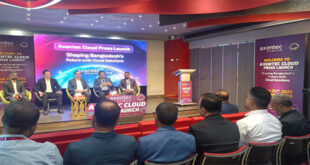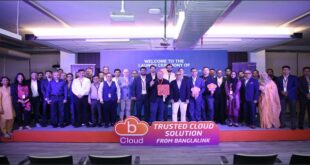InterCloud Limited is a company in Bangladesh that is part of a group with businesses in garment manufacturing, aviation, and telecommunications. Tusuka is known for making denim products in Bangladesh. Novoair is a premium passenger airline in Bangladesh with seven ATR-72 aircraft.
In 2008, Novotel Limited started in the telecommunications industry by acquiring an International Voice Gateway license. This was part of the government’s efforts to privatize and liberalize the industry. After successfully establishing the voice infrastructure and business, Novotel expanded into data business in 2012. They obtained three more licenses from BTRC: International Terrestrial Cable, International Internet Gateway, and National Internet Exchange (NIX), all under the name Novocom Limited.
Telecommunications operators in Bangladesh have a layered licensing structure. They need separate licenses from the Bangladesh Telecommunication Regulatory Commission (BTRC) for various services.
Novotel and Novocom work with over 500 international operators to provide global connectivity for voice, SMS, and data services. Their technology team has gained valuable experience through partnerships and interoperation with international telecom operators especially in ensuring uptime and resilience for telecom infrastructure, data center and telecom network. This experience boosted confidence in the team prompting to explore the provision of highly available services for the enterprise market in Bangladesh.
In 2013, the management decided to get an ISP license. A team within the company was responsible for coming up with a name for the new entity. The team at Novotel always aimed to bring innovation and added value to their business. At that time, cloud services were gaining popularity and it was believed that everything would eventually move to the cloud. While the ISP license was mainly for providing internet services, the team wanted to offer more than just internet connectivity to the enterprise market. They envisioned providing cloud services as well. That’s why they chose the name “InterCloud” to represent their ambition of bringing cloud services to Bangladesh in addition to internet services. The first tagline for InterCloud Limited was “More than Internet,” which reflected their ultimate vision. Later on, InterCloud Limited also obtained an IPTSP license, which allowed them to provide VoIP telephony services with different solutions for both retail and enterprise customers.
The company started offering cloud services with its original name. Then, the management decided to bring all their products and services together under the name “Brilliant” in InterCloud Limited. They also changed their tagline to “Solutions for a Smart World” in 2018.
When considering launching cloud services in Bangladesh, the management had debates about competing with global players like Amazon Web Services (AWS), Google Cloud Platform (GCP), and Microsoft Azure, who already dominate the market. There were concerns about not matching their scale or expertise. However, a member of the management team met with the Chief Operating Officer (COO) of CtrlS, an Indian data center and cloud service provider, in 2015. This meeting revealed that personalized service is highly valued by customers in our region. While global providers may have a presence in India, there is a significant difference in customer service that local providers can offer. This insight motivated the Intercloud management team to pursue a local public cloud service in Bangladesh.
The InterCloud technology team assessed different cloud solution platforms. Some platforms required expensive licenses and specific hardware. After evaluating, the team realized that choosing a licensed platform would limit their competitiveness. It would also bind them to certain hardware and require ongoing licensing fees. The team was motivated to create a local solution by their parent company Novotel Limited.
The Intercloud technical team chose to use the OpenStack open-source platform and got guidance from a consultant. They then used in-house and software teams to develop the platform with Python programming. Now, two separate teams maintain and manage Brilliant Cloud, each with specific responsibilities.
Cloud team selected hardware from various reputable brands like Dell, HP, Momentum, and OEM servers. They also implemented storage solutions from NetApp and network equipment from CISCO and Fortinet for firewall security. The team continues to expand the server infrastructure to support the growing business.
Initially, Brilliant Cloud Platform did not have a management portal for users. Users had to use IP addresses to log into their virtual machines (VMs). However, the Brilliant Software team created a cloud management portal that allows users to access and manage their VMs using a username and password, with the added security of two-factor authentication.
The Brilliant cloud platform now offers new features like launching instances, monitoring VMs with alarms, IAM, creating VPCs, deploying Network Security Groups, Object Storage (S3), Load Balancers (LB), and more. It also makes it simple to buy, pay for, and set up cloud services for small packages. Additionally, they have introduced other services such as Back up as a service (BaaS), Storage as a Service (SaaS), Brilliant Connect, Telephony and app-based Cloud PBX, A2P SMS services, and enterprise solutions. They can also provide private point to point connectivity as a network service provider, particularly for financial institutions.
The Brilliant Connect platform runs on 40 virtual machines (VMs) in the Brilliant Cloud, serving around 3 million registered customers. This helps us understand the strength of the cloud infrastructure.
Brilliant Cloud offers customers in Bangladesh local payment options, fast connections, and a monthly fixed bill with no unexpected charges for data usage. This is possible because Brilliant has established local Internet access through NIX, which allows them to waive data volume charges for now.
The software development team is working hard to add more features to the platform, aiming to compete in the global market. They have a long list of features that they are actively pursuing.
Introducing a new product like a local public cloud in the Bangladesh market in 2018 was undoubtedly a significant challenge. The market already suffered from a significant lack of trust when it came to online products and services. Additionally, IT heads and managers were hesitant to migrate their systems to the cloud, regardless of whether it was a local or global solution. Even government organizations, major corporations, and especially financial institutions were persistently investing in building their own small-scale data centers, showing reluctance to consider utilizing publicly offered data centers or cloud services.
Local customers prefer global cloud platforms like AWS, GCP, and Microsoft Azure, Digital Ocean. They face challenges like foreign currency payments, high latency, unpredictable data charges, and aThe clients preferred the global solutions.
The brilliant sales team initially focused on catering to the needs of startups and small to medium-sized enterprises (SMEs) for testing services. They encouraged local software companies to offer Software as a Service (SaaS) on the cloud platform. The valuable feedback from customers played a crucial role in improving the offerings. As the customer base expanded, large corporations also started benefiting from the wide range of cloud services. Currently, Brilliant Cloud has over 350 satisfied customers, both local and international, using the platform for their own use or to provide services. The mindset of local IT professionals towards cloud services is transforming based on market feedback. Developed markets made this transition over a decade ago, while the Indian market did so 5 to 7 years ago.
Intercloud management wants to thank everyone who has been part of Brilliant Cloud’s journey.
[Writer: Md Hasibur Rashid is the Director and Chief Marketing Officer of Intercloud Limited (www.intercloud.com.bd)]
 InfoSecBulletin Cybersecurity for mankind
InfoSecBulletin Cybersecurity for mankind














